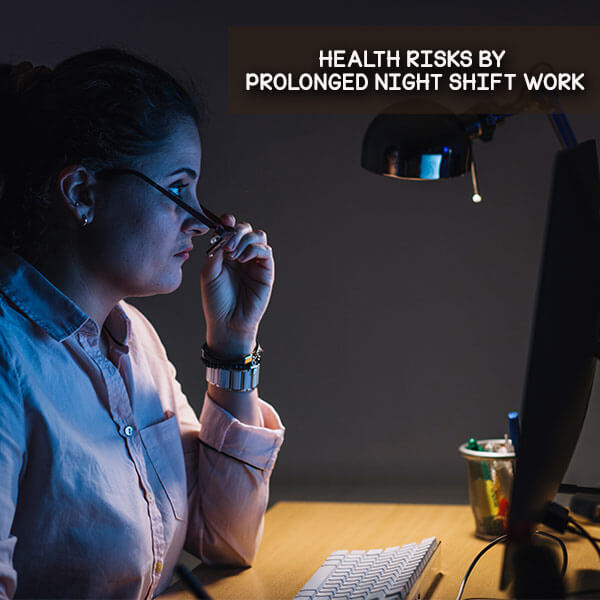 A collaborative partner of FitNet
A collaborative partner of FitNet A collaborative partner of FitNet
A collaborative partner of FitNet
Nowadays millions of people worldwide are working at night include police officers, firefighters, nurses, doctors, pilots, waitresses, truck drivers, and many more professionals. Many of them have a night job or rotate shifts during the week.
For many, it’s a life of passage in their careers; for others, it’s a financial necessity.
There is strong evidence that shift work is related to a number of serious health conditions. Our body is designed to work in the day, and rest at night. However, when we work at night, which is against our natural body rhythms, it can upset your body’s “internal clock.” which tells your body to be awake during the day and to sleep at night. When you work in shifts, you may find it hard to know when and what to eat. Sometimes you skip meals, eat irregularly, eat unhealthy food, It may also be hard to find enough time to exercise regularly.
Due to this you may have already experienced some of these common problems:

Short-Term Health Effects of Shift Work:
A change in your appetite; trouble falling asleep or getting a good night’s sleep; tend to have sleep disturbances and sleep loss. weight loss or weight gain; constipation, diarrhea, gas; indigestion, heartburn or stomach ulcers; and an increased risk of accidents or injury. Insomnia Decreased quality of life, General feeling of being unwell.
Long-Term Health Effects of Shift Work:
HIGH BLOOD PRESSURE.
CARDIOVASCULAR DISEASE: One review of the research found that shift work seems to raise the risk by 40%. One analysis found that the risk of STROKE increased by 5% for every five years a person performed shift work. However, it rose only after a person performed shift work for 15 years.
DIABETES AND METABOLIC SYNDROME A number of studies have found that shift work seems to be a risk factor for diabetes. Specifically, those who worked 16-hour shifts — had a 50% higher incidence of diabetes than day workers.
OBESITY: Poor diet and lack of exercise affects Hormone balance. The hormone leptin plays a key role in regulating our appetite; it helps us to feel full. Since shift work seems to lower the levels of leptin, it could be that night workers just feel hungrier — and thus eat more — than day workers.
DEPRESSION AND MOOD DISORDERS:
Some studies have found that shift workers are more likely to suffer from symptoms of depression and other mood disorders. The social isolation which might also affect brain chemistry directly . One 2007 study found that when compared to day workers, night workers had significantly lower levels of serotonin, a brain chemical that plays a key role in mood.
SERIOUS GASTROINTESTINAL PROBLEMS:
For more than 50 years, researchers have noticed that shift work seems to increase the risk of peptic ulcers. It also seems to raise the risk of general GI symptoms like nausea, diarrhea, and constipation, irritable bowel syndrome, chronic heartburn or GERD.
PROBLEMS WITH FERTILITY AND PREGNANCY:
Research has shown that shift work can affect a woman’s reproductive system. The results showed that flight attendants who worked during pregnancy were twice as likely to have a miscarriage . Shift work also seems to be associated with an increase the risk of complications during delivery, premature and low-weight babies, fertility problems, endometriosis, irregular periods, and painful periods.
There is some strong evidence — from both human and animal studies — that shift work poses an increased risk of cancer. A 2007, a subcommittee of the World Health Organization went as far as to state that shift work is “probably carcinogenic.” Two analyses of data from different studies found that night work increased the risk of breast cancer by 50%-70%, also colorectal and prostate cancer as well. So far, evidence suggests that the cancer risks go up only after 20 years of shift work . Also affects immune system.
So what You Can Do??
The good news is that by eating well and keeping active you can avoid some of these problems. Follow these nutrition tips to stay healthy, alert and feel your best at work and when you are at home. Steps you can take Here are 21 tips can help you stay healthy for shift workers.
1.Exercise regularly : Exercising regularly, eating well, and keeping a healthy weight could make a difference. Exercise may sound impossible to nurses working 12-hour shifts, but being consistent can help you maintain your energy and keep you at your best. If you can’t do a full workout on the days you work, at least get out and stretch your legs for a brisk walk, or do some yoga or another low impact activity. Then plan to go to the gym or work out with weights on your days off. Try to take walks, walk up and down stairs, or stretch before or after your shift or during your breaks. People who exercise not only burn more calories during the day, but they sleep better as well. The CDC recommends one hour of exercise each day, mixing intermediate- and moderate-aerobic exercise and vigorous-intensity physical activity. Just don’t forget to consult your doctor before starting any new exercise program.
There are many more you can do. There are other amazing ways to avoid the problem due to night shifts. Read my next blog to know more…HEALTH RISKS BY PROLONGED NIGHT SHIFT WORK Part – 2


Facebook Comments